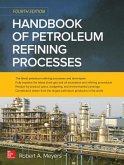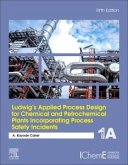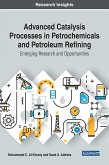- Gebundenes Buch
- Merkliste
- Auf die Merkliste
- Bewerten Bewerten
- Teilen
- Produkt teilen
- Produkterinnerung
- Produkterinnerung
From basic tenets to the latest advances, this is the most comprehensive and up-to-date coverage of the process of biodesulfurization in the petroleum refining industry. Petroleum refining and process engineering is constantly changing. No new refineries are being built, but companies all over the world are still expanding or re-purposing huge percentages of their refineries every year, year after year. Rather than building entirely new plants, companies are spending billions of dollars in the research and development of new processes that can save time and money by being more efficient and…mehr
Andere Kunden interessierten sich auch für
![Handbook of Petroleum Refining Processes, Fourth Edition Handbook of Petroleum Refining Processes, Fourth Edition]() Robert A MeyersHandbook of Petroleum Refining Processes, Fourth Edition265,99 €
Robert A MeyersHandbook of Petroleum Refining Processes, Fourth Edition265,99 €![Ludwig's Applied Process Design for Chemical and Petrochemical Plants Incorporating Process Safety Incidents Ludwig's Applied Process Design for Chemical and Petrochemical Plants Incorporating Process Safety Incidents]() A Kayode CokerLudwig's Applied Process Design for Chemical and Petrochemical Plants Incorporating Process Safety Incidents210,99 €
A Kayode CokerLudwig's Applied Process Design for Chemical and Petrochemical Plants Incorporating Process Safety Incidents210,99 €![Leveraging Synergies Between Refining and Petrochemical Processes Leveraging Synergies Between Refining and Petrochemical Processes]() Eberhard LuckeLeveraging Synergies Between Refining and Petrochemical Processes70,99 €
Eberhard LuckeLeveraging Synergies Between Refining and Petrochemical Processes70,99 €![Nonlinear Model-based Process Control Nonlinear Model-based Process Control]() Rashid M. AnsariNonlinear Model-based Process Control75,99 €
Rashid M. AnsariNonlinear Model-based Process Control75,99 €![Catalytic Hydroprocessing of Petroleum and Distillates Catalytic Hydroprocessing of Petroleum and Distillates]() Michael OballaCatalytic Hydroprocessing of Petroleum and Distillates432,99 €
Michael OballaCatalytic Hydroprocessing of Petroleum and Distillates432,99 €![Advanced Catalysis Processes in Petrochemicals and Petroleum Refining Advanced Catalysis Processes in Petrochemicals and Petroleum Refining]() Advanced Catalysis Processes in Petrochemicals and Petroleum Refining224,99 €
Advanced Catalysis Processes in Petrochemicals and Petroleum Refining224,99 €![Plant and Process Engineering 360 Plant and Process Engineering 360]() Mike TooleyPlant and Process Engineering 360163,99 €
Mike TooleyPlant and Process Engineering 360163,99 €-
-
-
From basic tenets to the latest advances, this is the most comprehensive and up-to-date coverage of the process of biodesulfurization in the petroleum refining industry. Petroleum refining and process engineering is constantly changing. No new refineries are being built, but companies all over the world are still expanding or re-purposing huge percentages of their refineries every year, year after year. Rather than building entirely new plants, companies are spending billions of dollars in the research and development of new processes that can save time and money by being more efficient and environmentally safer. Biodesulfurization is one of those processes, and nowhere else it is covered more thoroughly or with more up-to-date research of the new advances than in this new volume from Wiley-Scrivener. Besides the obvious benefits to biodesulfurization, there are new regulations in place within the industry with which companies will, over the next decade or longer, spend literally tens, if not hundreds, of billions of dollars to comply. Whether for the veteran engineer needing to update his or her library, the beginning engineer just learning about biodesulfurization, or even the student in a chemical engineering class, this outstanding new volume is a must-have. Especially it covers also the bioupgrading of crude oil and its fractions, biodenitrogenation technology and application of nanotechnology on both biodesulfurization and biodenitrogenation technologies. This groundbreaking new volume: * Provides a thorough explanation of the basics of the biodesulfurization process, including an overview of the chemical processes involved * Explains the applications and strengths of the biodesulfurization process in the refining industry * Covers all of the recent advances in the biodesulfurization process and how it can be utilized to save time and money and keep environmental problems from arising * Introduces the novice engineer or scientist to a valuable facet of process engineering being used today, while also giving the veteran engineer much-needed updates on today's ever-changing technology
Hinweis: Dieser Artikel kann nur an eine deutsche Lieferadresse ausgeliefert werden.
Hinweis: Dieser Artikel kann nur an eine deutsche Lieferadresse ausgeliefert werden.
Produktdetails
- Produktdetails
- Verlag: Wiley
- Seitenzahl: 1200
- Erscheinungstermin: 2. Oktober 2018
- Englisch
- Abmessung: 235mm x 157mm x 68mm
- Gewicht: 1844g
- ISBN-13: 9781119223580
- ISBN-10: 111922358X
- Artikelnr.: 47127550
- Herstellerkennzeichnung
- Libri GmbH
- Europaallee 1
- 36244 Bad Hersfeld
- gpsr@libri.de
- Verlag: Wiley
- Seitenzahl: 1200
- Erscheinungstermin: 2. Oktober 2018
- Englisch
- Abmessung: 235mm x 157mm x 68mm
- Gewicht: 1844g
- ISBN-13: 9781119223580
- ISBN-10: 111922358X
- Artikelnr.: 47127550
- Herstellerkennzeichnung
- Libri GmbH
- Europaallee 1
- 36244 Bad Hersfeld
- gpsr@libri.de
Nour Shafik El-Gendy, PhD, is a Professor of Petroleum and Environmental Biotechnology, vice head for the Department of Process Design & Development and former head manager of the Petroleum Biotechnology Lab at the Egyptian Petroleum Research Institute (EPRI). She is an editor, reviewer, and contributor to many scientific journals, including the Journal of Sustainable Energy Engineering, from Scrivener Publishing. She has numerous awards, papers, and presentations to her credit, including being the author or co-author of several books. She is vice coordinator of the Scientific Research Committee, National Council for Women (NCW) of Egypt and member in the Egyptian Young Academy of Sciences (EYAS). El-Gendy is an expert in the field of environmental pollution, wastewater treatment, biofuel, petroleum upgrading, green chemistry, nanobiotechnology, recycling of wastes and biocorrosion. She has extensive research, teaching, and lecturing experience. Hussein Mohamed Nabil Nassar, PhD, is a researcher at the Petroleum Biotechnology Laboratory at the Egyptian Petroleum Research Institute (EPRI). He has been the author or co-author of many scholarly papers and has extensive research experience in the field of bioremediation, biofuels, green chemistry, wastewater treatment, petroleum bioupgrading and nanobiotechnology.
Preface xiii
1 Background 1
List of Abbreviations and Nomenclature 1
1.1 Petroleum 2
1.2 Petroleum Composition 7
1.2.1 Petroleum Hydrocarbons 8
1.2.2 Petroleum Non-Hydrocarbons 12
1.2.2.1 Problems Generated by Asphaltenes 14
1.3 Sulfur Compounds 15
1.4 Sulfur in Petroleum Major Refinery Products 20
1.4.1 Gasoline 20
1.4.2 Kerosene 23
1.4.3 Jet Fuel 23
1.4.4 Diesel Fuel 23
1.4.5 Heating/Fuel Oils 24
1.4.6 Bunker Oil 24
1.5 Sulfur Problem 25
1.6 Legislative Regulations of Sulfur Levels in Fuels 29
References 32
2 Desulfurization Technologies 39
List of Abbreviations and Nomenclature 39
2.1 Introduction 43
2.2 Hydrodesulfurization 47
2.3 Oxidative Desulfurization 71
2.4 Selective Adsorption 108
2.5 Biocatalytic Desulfurization 127
2.5.1 Anaerobic Process 127
2.5.2 Aerobic Process 128
References 130
3 Biodesulfurization of Natural Gas 159
List of Abbreviations and Nomenclature 159
3.1 Introduction 161
3.2 Natural Gas Processing 169
3.3 Desulfurization Processes 183
3.3.1 Scavengers 183
3.3.2 Adsorption 187
3.3.3 Liquid Redox Processes 193
3.3.4 Claus Plants 195
3.3.4.1 Classic Claus Plant 196
3.3.4.2 Split-Flow Claus Plant 198
3.3.4.3 Oxygen Enrichment Claus Plant 199
3.3.4.4 Claus Plant Tail Gas 199
3.3.5 Absorption/Desorption Process 201
3.3.6 Biodesulfurization 203
3.3.6.1 Photoautotrophic Bacteria 206
3.3.6.2 Heterotrophic Bacteria 211
3.3.6.3 Chemotrophic Bacteria 212
3.3.7 Other Approaches Concerning the Biodesulfurization of Natural Gas 231
References 242
4 Microbial Denitrogenation of Petroleum and its Fractions 263
List of Abbreviations and Nomenclature 263
4.1 Introduction 265
4.2 Denitrogenation of Petroleum and its Fractions 269
4.2.1 Hydrodenitrogenation 269
4.2.2 Adsorptive Denitrogenation 272
4.2.3 Extractive and Catalytic Oxidative Denitrogenation 278
4.3 Microbial Attack of Nitrogen Polyaromatic Heterocyclic Compounds
(NPAHs) 279
4.4 Enhancing Biodegradation of NPAHs by Magnetic Nanoparticles 295
4.5 Challenges and Opportunities for BDN in Petroleum Industries 300
References 307
5 Bioadsorptive Desulfurization of Liquid Fuels 327
List of Abbreviations and Nomenclature 327
5.1 Introduction 329
5.2 ADS by Agroindustrial-Wastes Activated Carbon 332
5.3 ADS on Modified Activated Carbon 342
5.4 ADS on Carbon Aerogels 352
5.5 ADS on Activated Carbon Fibers 353
5.6 ADS on Natural Clay and Zeolites 355
5.7 ADS on New Adsorbents Prepared from Different Biowastes 360
References 365
6 Microbial Attack of Organosulfur Compounds 375
List of Abbreviations and Nomenclature 375
6.1 Introduction 377
6.2 Biodegradation of Sulfur Compounds in the Environment 380
6.3 Microbial Attack on Non-Heterocyclic Sulfur-Containing Hydrocarbons 383
6.3.1 Alkyl and Aryl Sulfides 383
6.3.2 Non - Aromatic Cyclic Sulfur - Containing Hydrocarbons 386
6.4 Microbial Attack of Heterocyclic Sulfur - Hydrocarbons 388
6.4.1 Thiophenes 389
6.4.2 Benzothiophenes and Alkyl-Substituted Benzothiophenes 390
6.4.3 Naphthothiophenes 402
6.4.4 Dibenzothiophene and Alkyl-Substituted Dibenzothiophenes 406
6.4.4.1 Aerobic Biodesulfurization of DBT 406
6.4.4.2 Aerobic Biodesulfurization of Alkylated DBT 419
6.4.4.3 Anaerobic Biodesulfurization of DBT 421
6.5 Recent Elucidated DBT-BDS Pathways 422
References 439
7 Enzymology and Genetics of Biodesulfurization Process 459
List of Abbreviations and Nomenclature 459
7.1 Introduction 461
7.2 Genetics of PASHs BDS Pathway 462
7.2.1 Anaerobic BDS Pathway 462
7.2.2 Aerobic BDS Pathway 463
7.2.2.1 Kodama Pathway 463
7.2.2.2 Complete Degradation Pathway 464
7.2.2.3 4S-Pathway 466
7.3 The Desulfurization dsz Genes 468
7.4 Enzymes Involved in Specific Desulfurization of Thiophenic Compounds
472
7.4.1 The Dsz Enzymes 472
7.4.1.1 DszC Enzyme (DBT-Monooxygenase) 474
7.4.1.2 DszA Enzyme (DBTO2-Monooxygenase) 476
7.4.1.3 DszB Enzyme (HBPS- Desulfinase) 477
7.4.1.4 DszD Enzyme (Flavin-Oxidoreductase Enzyme) 478
7.5 Repression of dsz Genes 480
7.6 Recombinant Biocatalysts for BDS 484
References 506
8 Factors Affecting the Biodesulfurization Process 521
List of Abbreviations and Nomenclature 521
8.1 Introduction 524
8.2 Effect of Incubation Period 525
8.3 Effect of Temperature and pH 527
8.4 Effect of Dissolved Oxygen Concentration 530
8.5 Effect of Agitation Speed 532
8.6 Effect of Initial Biomass Concentration 536
8.7 Effect of Biocatalyst Age 538
8.8 Effect of Mass Transfer 541
8.9 Effect of Surfactant 541
8.10 Effect of Initial Sulfur Concentration 544
8.11 Effect of Type of S-Compounds 546
8.12 Effect of Organic Solvent and Oil to Water Phase Ratio 553
8.13 Effect of Medium Composition 560
8.14 Effect of Growing and Resting Cells 579
8.15 Inhibitory Effect of Byproducts 580
8.16 Statistical Optimization 590
References 616
9 Kinetics of Batch Biodesulfurization Process 639
List of Abbreviations and Nomenclature 639
9.1 Introduction 642
9.2 General Background 643
9.2.1 Phases of Microbial Growth 643
9.2.1.1 The Lag Phase 644
9.2.1.2 The Log Phase 644
9.2.1.3 The Stationary Phase 645
9.2.1.4 The Decline Phase 645
9.2.2 Modeling of Population Growth as a Function of Incubation Time 645
9.3 Microbial Growth Kinetics 645
9.3.1 Exponential Growth Model 645
9.3.2 Logistic Growth Model 648
9.4 Some of the Classical Kinetic Models Applied in BDS-Studies 650
9.5 Factors Affecting the Rate of Microbial Growth 651
9.5.1 Effect of Temperature 651
9.5.2 Effect of pH 654
9.5.3 Effect of Oxygen 654
9.6 Enzyme Kinetics 654
9.6.1 Basic Enzyme Reactions 656
9.6.2 Factors Affecting the Enzyme Activity 657
9.6.2.1 Enzyme Concentration 657
9.6.2.2 Substrate Concentration 658
9.6.2.3 Effect of Inhibitors on Enzyme Activity 659
9.6.2.4 Effect of Temperature 660
9.6.2.5 Effect of pH 661
9.7 Michaelis-Menten Equation 662
9.7.1 Direct Integration Procedure 664
9.7.2 Lineweaver-Burk Plot Method 666
9.7.3 Eadie-Hofstee 666
9.8 Kinetics of a Multi-Substrates System 667
9.9 Traditional 4S-Pathway 668
9.9.1 Formulation of a Kinetic Model for DBT Desulfurization According to
4S-Pathway 669
9.10 Different Kinetic Studies on the Parameters Affecting the BDS Process
673
9.11 Evaluation of the Tested Biocatalysts 734
9.11.1 Kinetics of the Overall Biodesulfurization Reaction 735
9.11.2 Maximum Percentage of Desulfurization (XMAXBDS %) 735
9.11.3 Time for Maximum Biodesulfurization tBDSmax (min) 735
9.11.4 Initial DBT Removal Rate RODBT (¿mol/L/min) 736
9.11.5 Maximum Productivity PMAXBDS (%/min) 736
9.11.6 Specific Conversion Rate (SE %L/g/min) 736
References 737
10 Enhancement of BDS Efficiency 753
List of Abbreviations and Nomenclature 753
10.1 Introduction 756
10.2 Isolation of Selective Biodesulfurizing Microorganisms with Broad
Versatility on Different S-Compounds 757
10.2.1 Anaerobic Biodesulfurizing Microorganisms 758
10.2.2 Bacteria Capable of Aerobic Selective DBT-BDS 759
10.2.3 Microorganisms with Selective BDS of Benzothiophene and
Dibenzothiophene 769
10.2.4 Microorganisms with Methoxylation Pathway 770
10.2.5 Microorganisms with High Tolerance for Oil/Water Phase Ratio 771
10.2.6 Thermotolerant Microorganisms with Selective BDS Capability 772
10.2.7 BDS Using Yeast and Fungi 776
10.3 Genetics and its Role in Improvement of BDS Process 778
10.4 Overcoming the Repression Effects of Byproducts 789
10.5 Enzymatic Oxidation of Organosulfur Compounds 793
10.6 Enhancement of Biodesulfurization via Immobilization 795
10.6.1 Types of Immobilization 800
10.6.1.1 Adsorption 800
10.6.1.2 Covalent Binding 809
10.6.1.3 Encapsulation 809
10.6.1.4 Entrapment 810
10.7 Application of Nano-Technology in BDS Process 826
10.8 Role of Analytical Techniques in BDS 849
10.8.1 Gas Chromatography 850
10.8.1.1 Determination of Sulfur Compounds by GC 850
10.8.1.2 Assessment of Biodegradation 851
10.8.2 Presumptive Screening for Desulfurization and Identification of BDS
Pathway 852
10.8.2.1 Gibb's Assay 853
10.8.2.2 Phenol Assay 853
10.8.3 More Advanced Screening for Desulfurization and Identification of
BDS Pathway 854
10.8.3.1 High Performance Liquid Chromatography 854
10.8.3.2 X-ray Sulfur Meter and other Techniques for Determining Total
Sulfur Content 855 References 857
11 Biodesulfurization of Real Oil Feed 895
List of Abbreviations and Nomenclature 895
11.1 Introduction 897
11.2 Biodesulfurization of Crude Oil 903
11.3 Biodesulfurization of Different Oil Distillates 909
11.4 BDS of Crude Oil and its Distillates by Thermophilic Microorganisms
921
11.5 Application of Yeast and Fungi in BDS of Real Oil Feed 923
11.6 Biocatalytic Oxidation 924
11.7 Anaerobic BDS of Real Oil Feed 926
11.8 Deep Desulfurization of Fuel Streams by Integrating Microbial with
Non-Microbial Methods 928
11.8.1 BDS as a Complement to HDS 928
11.8.2 BDS as a Complementary to ADS 939
11.8.3 Coupling Non-Hydrodesulfurization with BDS 945
11.8.4 Three Step BDS-ODS-RADS 945
11.9 BDS of other Petroleum Products 946
References 952
12 Challenges and Opportunities 973
List of Abbreviations and Nomenclature 973
12.1 Introduction 975
12.2 New Strains with Broad Versatility 983
12.3 New Strains with Higher Hydrocarbon Tolerance 990
12.4 Overcoming the Feedback Inhibition of the End-Products 994
12.5 Biodesulfurization under Thermophilic Conditions 995
12.6 Anaerobic Biodesulfurization 997
12.7 Biocatalytic Oxidation 1000
12.8 Perspectives for Enhancing the Rate of BDS 1001
12.8.1 Application of Genetics in BDS 1002
12.8.2 Implementation of Resting Cells 1009
12.8.3 Microbial Consortium and BDS 1011
12.8.4 Surfactants and BDS 1014
12.8.5 Application of Nanotechnology in the BDS Process 1017
12.9 Production of Valuable Products 1028
12.10 Storage of Fuel and Sulfur 1031
12.11 Process Engineering Research 1033
12.12 BDS Process of Real Oil Feed 1053
12.13 BDS as a Complementary Technology 1061
12.14 Future Perspectives 1063
12.15 Techno-Economic Studies 1066
12.16 Economic Feasibility 1068
12.17 Fields of Developments 1077
12.18 BDS Now and Then 1080
12.19 Conclusion 1083
References 1084
Glossary 1119
Index 1155
1 Background 1
List of Abbreviations and Nomenclature 1
1.1 Petroleum 2
1.2 Petroleum Composition 7
1.2.1 Petroleum Hydrocarbons 8
1.2.2 Petroleum Non-Hydrocarbons 12
1.2.2.1 Problems Generated by Asphaltenes 14
1.3 Sulfur Compounds 15
1.4 Sulfur in Petroleum Major Refinery Products 20
1.4.1 Gasoline 20
1.4.2 Kerosene 23
1.4.3 Jet Fuel 23
1.4.4 Diesel Fuel 23
1.4.5 Heating/Fuel Oils 24
1.4.6 Bunker Oil 24
1.5 Sulfur Problem 25
1.6 Legislative Regulations of Sulfur Levels in Fuels 29
References 32
2 Desulfurization Technologies 39
List of Abbreviations and Nomenclature 39
2.1 Introduction 43
2.2 Hydrodesulfurization 47
2.3 Oxidative Desulfurization 71
2.4 Selective Adsorption 108
2.5 Biocatalytic Desulfurization 127
2.5.1 Anaerobic Process 127
2.5.2 Aerobic Process 128
References 130
3 Biodesulfurization of Natural Gas 159
List of Abbreviations and Nomenclature 159
3.1 Introduction 161
3.2 Natural Gas Processing 169
3.3 Desulfurization Processes 183
3.3.1 Scavengers 183
3.3.2 Adsorption 187
3.3.3 Liquid Redox Processes 193
3.3.4 Claus Plants 195
3.3.4.1 Classic Claus Plant 196
3.3.4.2 Split-Flow Claus Plant 198
3.3.4.3 Oxygen Enrichment Claus Plant 199
3.3.4.4 Claus Plant Tail Gas 199
3.3.5 Absorption/Desorption Process 201
3.3.6 Biodesulfurization 203
3.3.6.1 Photoautotrophic Bacteria 206
3.3.6.2 Heterotrophic Bacteria 211
3.3.6.3 Chemotrophic Bacteria 212
3.3.7 Other Approaches Concerning the Biodesulfurization of Natural Gas 231
References 242
4 Microbial Denitrogenation of Petroleum and its Fractions 263
List of Abbreviations and Nomenclature 263
4.1 Introduction 265
4.2 Denitrogenation of Petroleum and its Fractions 269
4.2.1 Hydrodenitrogenation 269
4.2.2 Adsorptive Denitrogenation 272
4.2.3 Extractive and Catalytic Oxidative Denitrogenation 278
4.3 Microbial Attack of Nitrogen Polyaromatic Heterocyclic Compounds
(NPAHs) 279
4.4 Enhancing Biodegradation of NPAHs by Magnetic Nanoparticles 295
4.5 Challenges and Opportunities for BDN in Petroleum Industries 300
References 307
5 Bioadsorptive Desulfurization of Liquid Fuels 327
List of Abbreviations and Nomenclature 327
5.1 Introduction 329
5.2 ADS by Agroindustrial-Wastes Activated Carbon 332
5.3 ADS on Modified Activated Carbon 342
5.4 ADS on Carbon Aerogels 352
5.5 ADS on Activated Carbon Fibers 353
5.6 ADS on Natural Clay and Zeolites 355
5.7 ADS on New Adsorbents Prepared from Different Biowastes 360
References 365
6 Microbial Attack of Organosulfur Compounds 375
List of Abbreviations and Nomenclature 375
6.1 Introduction 377
6.2 Biodegradation of Sulfur Compounds in the Environment 380
6.3 Microbial Attack on Non-Heterocyclic Sulfur-Containing Hydrocarbons 383
6.3.1 Alkyl and Aryl Sulfides 383
6.3.2 Non - Aromatic Cyclic Sulfur - Containing Hydrocarbons 386
6.4 Microbial Attack of Heterocyclic Sulfur - Hydrocarbons 388
6.4.1 Thiophenes 389
6.4.2 Benzothiophenes and Alkyl-Substituted Benzothiophenes 390
6.4.3 Naphthothiophenes 402
6.4.4 Dibenzothiophene and Alkyl-Substituted Dibenzothiophenes 406
6.4.4.1 Aerobic Biodesulfurization of DBT 406
6.4.4.2 Aerobic Biodesulfurization of Alkylated DBT 419
6.4.4.3 Anaerobic Biodesulfurization of DBT 421
6.5 Recent Elucidated DBT-BDS Pathways 422
References 439
7 Enzymology and Genetics of Biodesulfurization Process 459
List of Abbreviations and Nomenclature 459
7.1 Introduction 461
7.2 Genetics of PASHs BDS Pathway 462
7.2.1 Anaerobic BDS Pathway 462
7.2.2 Aerobic BDS Pathway 463
7.2.2.1 Kodama Pathway 463
7.2.2.2 Complete Degradation Pathway 464
7.2.2.3 4S-Pathway 466
7.3 The Desulfurization dsz Genes 468
7.4 Enzymes Involved in Specific Desulfurization of Thiophenic Compounds
472
7.4.1 The Dsz Enzymes 472
7.4.1.1 DszC Enzyme (DBT-Monooxygenase) 474
7.4.1.2 DszA Enzyme (DBTO2-Monooxygenase) 476
7.4.1.3 DszB Enzyme (HBPS- Desulfinase) 477
7.4.1.4 DszD Enzyme (Flavin-Oxidoreductase Enzyme) 478
7.5 Repression of dsz Genes 480
7.6 Recombinant Biocatalysts for BDS 484
References 506
8 Factors Affecting the Biodesulfurization Process 521
List of Abbreviations and Nomenclature 521
8.1 Introduction 524
8.2 Effect of Incubation Period 525
8.3 Effect of Temperature and pH 527
8.4 Effect of Dissolved Oxygen Concentration 530
8.5 Effect of Agitation Speed 532
8.6 Effect of Initial Biomass Concentration 536
8.7 Effect of Biocatalyst Age 538
8.8 Effect of Mass Transfer 541
8.9 Effect of Surfactant 541
8.10 Effect of Initial Sulfur Concentration 544
8.11 Effect of Type of S-Compounds 546
8.12 Effect of Organic Solvent and Oil to Water Phase Ratio 553
8.13 Effect of Medium Composition 560
8.14 Effect of Growing and Resting Cells 579
8.15 Inhibitory Effect of Byproducts 580
8.16 Statistical Optimization 590
References 616
9 Kinetics of Batch Biodesulfurization Process 639
List of Abbreviations and Nomenclature 639
9.1 Introduction 642
9.2 General Background 643
9.2.1 Phases of Microbial Growth 643
9.2.1.1 The Lag Phase 644
9.2.1.2 The Log Phase 644
9.2.1.3 The Stationary Phase 645
9.2.1.4 The Decline Phase 645
9.2.2 Modeling of Population Growth as a Function of Incubation Time 645
9.3 Microbial Growth Kinetics 645
9.3.1 Exponential Growth Model 645
9.3.2 Logistic Growth Model 648
9.4 Some of the Classical Kinetic Models Applied in BDS-Studies 650
9.5 Factors Affecting the Rate of Microbial Growth 651
9.5.1 Effect of Temperature 651
9.5.2 Effect of pH 654
9.5.3 Effect of Oxygen 654
9.6 Enzyme Kinetics 654
9.6.1 Basic Enzyme Reactions 656
9.6.2 Factors Affecting the Enzyme Activity 657
9.6.2.1 Enzyme Concentration 657
9.6.2.2 Substrate Concentration 658
9.6.2.3 Effect of Inhibitors on Enzyme Activity 659
9.6.2.4 Effect of Temperature 660
9.6.2.5 Effect of pH 661
9.7 Michaelis-Menten Equation 662
9.7.1 Direct Integration Procedure 664
9.7.2 Lineweaver-Burk Plot Method 666
9.7.3 Eadie-Hofstee 666
9.8 Kinetics of a Multi-Substrates System 667
9.9 Traditional 4S-Pathway 668
9.9.1 Formulation of a Kinetic Model for DBT Desulfurization According to
4S-Pathway 669
9.10 Different Kinetic Studies on the Parameters Affecting the BDS Process
673
9.11 Evaluation of the Tested Biocatalysts 734
9.11.1 Kinetics of the Overall Biodesulfurization Reaction 735
9.11.2 Maximum Percentage of Desulfurization (XMAXBDS %) 735
9.11.3 Time for Maximum Biodesulfurization tBDSmax (min) 735
9.11.4 Initial DBT Removal Rate RODBT (¿mol/L/min) 736
9.11.5 Maximum Productivity PMAXBDS (%/min) 736
9.11.6 Specific Conversion Rate (SE %L/g/min) 736
References 737
10 Enhancement of BDS Efficiency 753
List of Abbreviations and Nomenclature 753
10.1 Introduction 756
10.2 Isolation of Selective Biodesulfurizing Microorganisms with Broad
Versatility on Different S-Compounds 757
10.2.1 Anaerobic Biodesulfurizing Microorganisms 758
10.2.2 Bacteria Capable of Aerobic Selective DBT-BDS 759
10.2.3 Microorganisms with Selective BDS of Benzothiophene and
Dibenzothiophene 769
10.2.4 Microorganisms with Methoxylation Pathway 770
10.2.5 Microorganisms with High Tolerance for Oil/Water Phase Ratio 771
10.2.6 Thermotolerant Microorganisms with Selective BDS Capability 772
10.2.7 BDS Using Yeast and Fungi 776
10.3 Genetics and its Role in Improvement of BDS Process 778
10.4 Overcoming the Repression Effects of Byproducts 789
10.5 Enzymatic Oxidation of Organosulfur Compounds 793
10.6 Enhancement of Biodesulfurization via Immobilization 795
10.6.1 Types of Immobilization 800
10.6.1.1 Adsorption 800
10.6.1.2 Covalent Binding 809
10.6.1.3 Encapsulation 809
10.6.1.4 Entrapment 810
10.7 Application of Nano-Technology in BDS Process 826
10.8 Role of Analytical Techniques in BDS 849
10.8.1 Gas Chromatography 850
10.8.1.1 Determination of Sulfur Compounds by GC 850
10.8.1.2 Assessment of Biodegradation 851
10.8.2 Presumptive Screening for Desulfurization and Identification of BDS
Pathway 852
10.8.2.1 Gibb's Assay 853
10.8.2.2 Phenol Assay 853
10.8.3 More Advanced Screening for Desulfurization and Identification of
BDS Pathway 854
10.8.3.1 High Performance Liquid Chromatography 854
10.8.3.2 X-ray Sulfur Meter and other Techniques for Determining Total
Sulfur Content 855 References 857
11 Biodesulfurization of Real Oil Feed 895
List of Abbreviations and Nomenclature 895
11.1 Introduction 897
11.2 Biodesulfurization of Crude Oil 903
11.3 Biodesulfurization of Different Oil Distillates 909
11.4 BDS of Crude Oil and its Distillates by Thermophilic Microorganisms
921
11.5 Application of Yeast and Fungi in BDS of Real Oil Feed 923
11.6 Biocatalytic Oxidation 924
11.7 Anaerobic BDS of Real Oil Feed 926
11.8 Deep Desulfurization of Fuel Streams by Integrating Microbial with
Non-Microbial Methods 928
11.8.1 BDS as a Complement to HDS 928
11.8.2 BDS as a Complementary to ADS 939
11.8.3 Coupling Non-Hydrodesulfurization with BDS 945
11.8.4 Three Step BDS-ODS-RADS 945
11.9 BDS of other Petroleum Products 946
References 952
12 Challenges and Opportunities 973
List of Abbreviations and Nomenclature 973
12.1 Introduction 975
12.2 New Strains with Broad Versatility 983
12.3 New Strains with Higher Hydrocarbon Tolerance 990
12.4 Overcoming the Feedback Inhibition of the End-Products 994
12.5 Biodesulfurization under Thermophilic Conditions 995
12.6 Anaerobic Biodesulfurization 997
12.7 Biocatalytic Oxidation 1000
12.8 Perspectives for Enhancing the Rate of BDS 1001
12.8.1 Application of Genetics in BDS 1002
12.8.2 Implementation of Resting Cells 1009
12.8.3 Microbial Consortium and BDS 1011
12.8.4 Surfactants and BDS 1014
12.8.5 Application of Nanotechnology in the BDS Process 1017
12.9 Production of Valuable Products 1028
12.10 Storage of Fuel and Sulfur 1031
12.11 Process Engineering Research 1033
12.12 BDS Process of Real Oil Feed 1053
12.13 BDS as a Complementary Technology 1061
12.14 Future Perspectives 1063
12.15 Techno-Economic Studies 1066
12.16 Economic Feasibility 1068
12.17 Fields of Developments 1077
12.18 BDS Now and Then 1080
12.19 Conclusion 1083
References 1084
Glossary 1119
Index 1155
Preface xiii
1 Background 1
List of Abbreviations and Nomenclature 1
1.1 Petroleum 2
1.2 Petroleum Composition 7
1.2.1 Petroleum Hydrocarbons 8
1.2.2 Petroleum Non-Hydrocarbons 12
1.2.2.1 Problems Generated by Asphaltenes 14
1.3 Sulfur Compounds 15
1.4 Sulfur in Petroleum Major Refinery Products 20
1.4.1 Gasoline 20
1.4.2 Kerosene 23
1.4.3 Jet Fuel 23
1.4.4 Diesel Fuel 23
1.4.5 Heating/Fuel Oils 24
1.4.6 Bunker Oil 24
1.5 Sulfur Problem 25
1.6 Legislative Regulations of Sulfur Levels in Fuels 29
References 32
2 Desulfurization Technologies 39
List of Abbreviations and Nomenclature 39
2.1 Introduction 43
2.2 Hydrodesulfurization 47
2.3 Oxidative Desulfurization 71
2.4 Selective Adsorption 108
2.5 Biocatalytic Desulfurization 127
2.5.1 Anaerobic Process 127
2.5.2 Aerobic Process 128
References 130
3 Biodesulfurization of Natural Gas 159
List of Abbreviations and Nomenclature 159
3.1 Introduction 161
3.2 Natural Gas Processing 169
3.3 Desulfurization Processes 183
3.3.1 Scavengers 183
3.3.2 Adsorption 187
3.3.3 Liquid Redox Processes 193
3.3.4 Claus Plants 195
3.3.4.1 Classic Claus Plant 196
3.3.4.2 Split-Flow Claus Plant 198
3.3.4.3 Oxygen Enrichment Claus Plant 199
3.3.4.4 Claus Plant Tail Gas 199
3.3.5 Absorption/Desorption Process 201
3.3.6 Biodesulfurization 203
3.3.6.1 Photoautotrophic Bacteria 206
3.3.6.2 Heterotrophic Bacteria 211
3.3.6.3 Chemotrophic Bacteria 212
3.3.7 Other Approaches Concerning the Biodesulfurization of Natural Gas 231
References 242
4 Microbial Denitrogenation of Petroleum and its Fractions 263
List of Abbreviations and Nomenclature 263
4.1 Introduction 265
4.2 Denitrogenation of Petroleum and its Fractions 269
4.2.1 Hydrodenitrogenation 269
4.2.2 Adsorptive Denitrogenation 272
4.2.3 Extractive and Catalytic Oxidative Denitrogenation 278
4.3 Microbial Attack of Nitrogen Polyaromatic Heterocyclic Compounds
(NPAHs) 279
4.4 Enhancing Biodegradation of NPAHs by Magnetic Nanoparticles 295
4.5 Challenges and Opportunities for BDN in Petroleum Industries 300
References 307
5 Bioadsorptive Desulfurization of Liquid Fuels 327
List of Abbreviations and Nomenclature 327
5.1 Introduction 329
5.2 ADS by Agroindustrial-Wastes Activated Carbon 332
5.3 ADS on Modified Activated Carbon 342
5.4 ADS on Carbon Aerogels 352
5.5 ADS on Activated Carbon Fibers 353
5.6 ADS on Natural Clay and Zeolites 355
5.7 ADS on New Adsorbents Prepared from Different Biowastes 360
References 365
6 Microbial Attack of Organosulfur Compounds 375
List of Abbreviations and Nomenclature 375
6.1 Introduction 377
6.2 Biodegradation of Sulfur Compounds in the Environment 380
6.3 Microbial Attack on Non-Heterocyclic Sulfur-Containing Hydrocarbons 383
6.3.1 Alkyl and Aryl Sulfides 383
6.3.2 Non - Aromatic Cyclic Sulfur - Containing Hydrocarbons 386
6.4 Microbial Attack of Heterocyclic Sulfur - Hydrocarbons 388
6.4.1 Thiophenes 389
6.4.2 Benzothiophenes and Alkyl-Substituted Benzothiophenes 390
6.4.3 Naphthothiophenes 402
6.4.4 Dibenzothiophene and Alkyl-Substituted Dibenzothiophenes 406
6.4.4.1 Aerobic Biodesulfurization of DBT 406
6.4.4.2 Aerobic Biodesulfurization of Alkylated DBT 419
6.4.4.3 Anaerobic Biodesulfurization of DBT 421
6.5 Recent Elucidated DBT-BDS Pathways 422
References 439
7 Enzymology and Genetics of Biodesulfurization Process 459
List of Abbreviations and Nomenclature 459
7.1 Introduction 461
7.2 Genetics of PASHs BDS Pathway 462
7.2.1 Anaerobic BDS Pathway 462
7.2.2 Aerobic BDS Pathway 463
7.2.2.1 Kodama Pathway 463
7.2.2.2 Complete Degradation Pathway 464
7.2.2.3 4S-Pathway 466
7.3 The Desulfurization dsz Genes 468
7.4 Enzymes Involved in Specific Desulfurization of Thiophenic Compounds
472
7.4.1 The Dsz Enzymes 472
7.4.1.1 DszC Enzyme (DBT-Monooxygenase) 474
7.4.1.2 DszA Enzyme (DBTO2-Monooxygenase) 476
7.4.1.3 DszB Enzyme (HBPS- Desulfinase) 477
7.4.1.4 DszD Enzyme (Flavin-Oxidoreductase Enzyme) 478
7.5 Repression of dsz Genes 480
7.6 Recombinant Biocatalysts for BDS 484
References 506
8 Factors Affecting the Biodesulfurization Process 521
List of Abbreviations and Nomenclature 521
8.1 Introduction 524
8.2 Effect of Incubation Period 525
8.3 Effect of Temperature and pH 527
8.4 Effect of Dissolved Oxygen Concentration 530
8.5 Effect of Agitation Speed 532
8.6 Effect of Initial Biomass Concentration 536
8.7 Effect of Biocatalyst Age 538
8.8 Effect of Mass Transfer 541
8.9 Effect of Surfactant 541
8.10 Effect of Initial Sulfur Concentration 544
8.11 Effect of Type of S-Compounds 546
8.12 Effect of Organic Solvent and Oil to Water Phase Ratio 553
8.13 Effect of Medium Composition 560
8.14 Effect of Growing and Resting Cells 579
8.15 Inhibitory Effect of Byproducts 580
8.16 Statistical Optimization 590
References 616
9 Kinetics of Batch Biodesulfurization Process 639
List of Abbreviations and Nomenclature 639
9.1 Introduction 642
9.2 General Background 643
9.2.1 Phases of Microbial Growth 643
9.2.1.1 The Lag Phase 644
9.2.1.2 The Log Phase 644
9.2.1.3 The Stationary Phase 645
9.2.1.4 The Decline Phase 645
9.2.2 Modeling of Population Growth as a Function of Incubation Time 645
9.3 Microbial Growth Kinetics 645
9.3.1 Exponential Growth Model 645
9.3.2 Logistic Growth Model 648
9.4 Some of the Classical Kinetic Models Applied in BDS-Studies 650
9.5 Factors Affecting the Rate of Microbial Growth 651
9.5.1 Effect of Temperature 651
9.5.2 Effect of pH 654
9.5.3 Effect of Oxygen 654
9.6 Enzyme Kinetics 654
9.6.1 Basic Enzyme Reactions 656
9.6.2 Factors Affecting the Enzyme Activity 657
9.6.2.1 Enzyme Concentration 657
9.6.2.2 Substrate Concentration 658
9.6.2.3 Effect of Inhibitors on Enzyme Activity 659
9.6.2.4 Effect of Temperature 660
9.6.2.5 Effect of pH 661
9.7 Michaelis-Menten Equation 662
9.7.1 Direct Integration Procedure 664
9.7.2 Lineweaver-Burk Plot Method 666
9.7.3 Eadie-Hofstee 666
9.8 Kinetics of a Multi-Substrates System 667
9.9 Traditional 4S-Pathway 668
9.9.1 Formulation of a Kinetic Model for DBT Desulfurization According to
4S-Pathway 669
9.10 Different Kinetic Studies on the Parameters Affecting the BDS Process
673
9.11 Evaluation of the Tested Biocatalysts 734
9.11.1 Kinetics of the Overall Biodesulfurization Reaction 735
9.11.2 Maximum Percentage of Desulfurization (XMAXBDS %) 735
9.11.3 Time for Maximum Biodesulfurization tBDSmax (min) 735
9.11.4 Initial DBT Removal Rate RODBT (¿mol/L/min) 736
9.11.5 Maximum Productivity PMAXBDS (%/min) 736
9.11.6 Specific Conversion Rate (SE %L/g/min) 736
References 737
10 Enhancement of BDS Efficiency 753
List of Abbreviations and Nomenclature 753
10.1 Introduction 756
10.2 Isolation of Selective Biodesulfurizing Microorganisms with Broad
Versatility on Different S-Compounds 757
10.2.1 Anaerobic Biodesulfurizing Microorganisms 758
10.2.2 Bacteria Capable of Aerobic Selective DBT-BDS 759
10.2.3 Microorganisms with Selective BDS of Benzothiophene and
Dibenzothiophene 769
10.2.4 Microorganisms with Methoxylation Pathway 770
10.2.5 Microorganisms with High Tolerance for Oil/Water Phase Ratio 771
10.2.6 Thermotolerant Microorganisms with Selective BDS Capability 772
10.2.7 BDS Using Yeast and Fungi 776
10.3 Genetics and its Role in Improvement of BDS Process 778
10.4 Overcoming the Repression Effects of Byproducts 789
10.5 Enzymatic Oxidation of Organosulfur Compounds 793
10.6 Enhancement of Biodesulfurization via Immobilization 795
10.6.1 Types of Immobilization 800
10.6.1.1 Adsorption 800
10.6.1.2 Covalent Binding 809
10.6.1.3 Encapsulation 809
10.6.1.4 Entrapment 810
10.7 Application of Nano-Technology in BDS Process 826
10.8 Role of Analytical Techniques in BDS 849
10.8.1 Gas Chromatography 850
10.8.1.1 Determination of Sulfur Compounds by GC 850
10.8.1.2 Assessment of Biodegradation 851
10.8.2 Presumptive Screening for Desulfurization and Identification of BDS
Pathway 852
10.8.2.1 Gibb's Assay 853
10.8.2.2 Phenol Assay 853
10.8.3 More Advanced Screening for Desulfurization and Identification of
BDS Pathway 854
10.8.3.1 High Performance Liquid Chromatography 854
10.8.3.2 X-ray Sulfur Meter and other Techniques for Determining Total
Sulfur Content 855 References 857
11 Biodesulfurization of Real Oil Feed 895
List of Abbreviations and Nomenclature 895
11.1 Introduction 897
11.2 Biodesulfurization of Crude Oil 903
11.3 Biodesulfurization of Different Oil Distillates 909
11.4 BDS of Crude Oil and its Distillates by Thermophilic Microorganisms
921
11.5 Application of Yeast and Fungi in BDS of Real Oil Feed 923
11.6 Biocatalytic Oxidation 924
11.7 Anaerobic BDS of Real Oil Feed 926
11.8 Deep Desulfurization of Fuel Streams by Integrating Microbial with
Non-Microbial Methods 928
11.8.1 BDS as a Complement to HDS 928
11.8.2 BDS as a Complementary to ADS 939
11.8.3 Coupling Non-Hydrodesulfurization with BDS 945
11.8.4 Three Step BDS-ODS-RADS 945
11.9 BDS of other Petroleum Products 946
References 952
12 Challenges and Opportunities 973
List of Abbreviations and Nomenclature 973
12.1 Introduction 975
12.2 New Strains with Broad Versatility 983
12.3 New Strains with Higher Hydrocarbon Tolerance 990
12.4 Overcoming the Feedback Inhibition of the End-Products 994
12.5 Biodesulfurization under Thermophilic Conditions 995
12.6 Anaerobic Biodesulfurization 997
12.7 Biocatalytic Oxidation 1000
12.8 Perspectives for Enhancing the Rate of BDS 1001
12.8.1 Application of Genetics in BDS 1002
12.8.2 Implementation of Resting Cells 1009
12.8.3 Microbial Consortium and BDS 1011
12.8.4 Surfactants and BDS 1014
12.8.5 Application of Nanotechnology in the BDS Process 1017
12.9 Production of Valuable Products 1028
12.10 Storage of Fuel and Sulfur 1031
12.11 Process Engineering Research 1033
12.12 BDS Process of Real Oil Feed 1053
12.13 BDS as a Complementary Technology 1061
12.14 Future Perspectives 1063
12.15 Techno-Economic Studies 1066
12.16 Economic Feasibility 1068
12.17 Fields of Developments 1077
12.18 BDS Now and Then 1080
12.19 Conclusion 1083
References 1084
Glossary 1119
Index 1155
1 Background 1
List of Abbreviations and Nomenclature 1
1.1 Petroleum 2
1.2 Petroleum Composition 7
1.2.1 Petroleum Hydrocarbons 8
1.2.2 Petroleum Non-Hydrocarbons 12
1.2.2.1 Problems Generated by Asphaltenes 14
1.3 Sulfur Compounds 15
1.4 Sulfur in Petroleum Major Refinery Products 20
1.4.1 Gasoline 20
1.4.2 Kerosene 23
1.4.3 Jet Fuel 23
1.4.4 Diesel Fuel 23
1.4.5 Heating/Fuel Oils 24
1.4.6 Bunker Oil 24
1.5 Sulfur Problem 25
1.6 Legislative Regulations of Sulfur Levels in Fuels 29
References 32
2 Desulfurization Technologies 39
List of Abbreviations and Nomenclature 39
2.1 Introduction 43
2.2 Hydrodesulfurization 47
2.3 Oxidative Desulfurization 71
2.4 Selective Adsorption 108
2.5 Biocatalytic Desulfurization 127
2.5.1 Anaerobic Process 127
2.5.2 Aerobic Process 128
References 130
3 Biodesulfurization of Natural Gas 159
List of Abbreviations and Nomenclature 159
3.1 Introduction 161
3.2 Natural Gas Processing 169
3.3 Desulfurization Processes 183
3.3.1 Scavengers 183
3.3.2 Adsorption 187
3.3.3 Liquid Redox Processes 193
3.3.4 Claus Plants 195
3.3.4.1 Classic Claus Plant 196
3.3.4.2 Split-Flow Claus Plant 198
3.3.4.3 Oxygen Enrichment Claus Plant 199
3.3.4.4 Claus Plant Tail Gas 199
3.3.5 Absorption/Desorption Process 201
3.3.6 Biodesulfurization 203
3.3.6.1 Photoautotrophic Bacteria 206
3.3.6.2 Heterotrophic Bacteria 211
3.3.6.3 Chemotrophic Bacteria 212
3.3.7 Other Approaches Concerning the Biodesulfurization of Natural Gas 231
References 242
4 Microbial Denitrogenation of Petroleum and its Fractions 263
List of Abbreviations and Nomenclature 263
4.1 Introduction 265
4.2 Denitrogenation of Petroleum and its Fractions 269
4.2.1 Hydrodenitrogenation 269
4.2.2 Adsorptive Denitrogenation 272
4.2.3 Extractive and Catalytic Oxidative Denitrogenation 278
4.3 Microbial Attack of Nitrogen Polyaromatic Heterocyclic Compounds
(NPAHs) 279
4.4 Enhancing Biodegradation of NPAHs by Magnetic Nanoparticles 295
4.5 Challenges and Opportunities for BDN in Petroleum Industries 300
References 307
5 Bioadsorptive Desulfurization of Liquid Fuels 327
List of Abbreviations and Nomenclature 327
5.1 Introduction 329
5.2 ADS by Agroindustrial-Wastes Activated Carbon 332
5.3 ADS on Modified Activated Carbon 342
5.4 ADS on Carbon Aerogels 352
5.5 ADS on Activated Carbon Fibers 353
5.6 ADS on Natural Clay and Zeolites 355
5.7 ADS on New Adsorbents Prepared from Different Biowastes 360
References 365
6 Microbial Attack of Organosulfur Compounds 375
List of Abbreviations and Nomenclature 375
6.1 Introduction 377
6.2 Biodegradation of Sulfur Compounds in the Environment 380
6.3 Microbial Attack on Non-Heterocyclic Sulfur-Containing Hydrocarbons 383
6.3.1 Alkyl and Aryl Sulfides 383
6.3.2 Non - Aromatic Cyclic Sulfur - Containing Hydrocarbons 386
6.4 Microbial Attack of Heterocyclic Sulfur - Hydrocarbons 388
6.4.1 Thiophenes 389
6.4.2 Benzothiophenes and Alkyl-Substituted Benzothiophenes 390
6.4.3 Naphthothiophenes 402
6.4.4 Dibenzothiophene and Alkyl-Substituted Dibenzothiophenes 406
6.4.4.1 Aerobic Biodesulfurization of DBT 406
6.4.4.2 Aerobic Biodesulfurization of Alkylated DBT 419
6.4.4.3 Anaerobic Biodesulfurization of DBT 421
6.5 Recent Elucidated DBT-BDS Pathways 422
References 439
7 Enzymology and Genetics of Biodesulfurization Process 459
List of Abbreviations and Nomenclature 459
7.1 Introduction 461
7.2 Genetics of PASHs BDS Pathway 462
7.2.1 Anaerobic BDS Pathway 462
7.2.2 Aerobic BDS Pathway 463
7.2.2.1 Kodama Pathway 463
7.2.2.2 Complete Degradation Pathway 464
7.2.2.3 4S-Pathway 466
7.3 The Desulfurization dsz Genes 468
7.4 Enzymes Involved in Specific Desulfurization of Thiophenic Compounds
472
7.4.1 The Dsz Enzymes 472
7.4.1.1 DszC Enzyme (DBT-Monooxygenase) 474
7.4.1.2 DszA Enzyme (DBTO2-Monooxygenase) 476
7.4.1.3 DszB Enzyme (HBPS- Desulfinase) 477
7.4.1.4 DszD Enzyme (Flavin-Oxidoreductase Enzyme) 478
7.5 Repression of dsz Genes 480
7.6 Recombinant Biocatalysts for BDS 484
References 506
8 Factors Affecting the Biodesulfurization Process 521
List of Abbreviations and Nomenclature 521
8.1 Introduction 524
8.2 Effect of Incubation Period 525
8.3 Effect of Temperature and pH 527
8.4 Effect of Dissolved Oxygen Concentration 530
8.5 Effect of Agitation Speed 532
8.6 Effect of Initial Biomass Concentration 536
8.7 Effect of Biocatalyst Age 538
8.8 Effect of Mass Transfer 541
8.9 Effect of Surfactant 541
8.10 Effect of Initial Sulfur Concentration 544
8.11 Effect of Type of S-Compounds 546
8.12 Effect of Organic Solvent and Oil to Water Phase Ratio 553
8.13 Effect of Medium Composition 560
8.14 Effect of Growing and Resting Cells 579
8.15 Inhibitory Effect of Byproducts 580
8.16 Statistical Optimization 590
References 616
9 Kinetics of Batch Biodesulfurization Process 639
List of Abbreviations and Nomenclature 639
9.1 Introduction 642
9.2 General Background 643
9.2.1 Phases of Microbial Growth 643
9.2.1.1 The Lag Phase 644
9.2.1.2 The Log Phase 644
9.2.1.3 The Stationary Phase 645
9.2.1.4 The Decline Phase 645
9.2.2 Modeling of Population Growth as a Function of Incubation Time 645
9.3 Microbial Growth Kinetics 645
9.3.1 Exponential Growth Model 645
9.3.2 Logistic Growth Model 648
9.4 Some of the Classical Kinetic Models Applied in BDS-Studies 650
9.5 Factors Affecting the Rate of Microbial Growth 651
9.5.1 Effect of Temperature 651
9.5.2 Effect of pH 654
9.5.3 Effect of Oxygen 654
9.6 Enzyme Kinetics 654
9.6.1 Basic Enzyme Reactions 656
9.6.2 Factors Affecting the Enzyme Activity 657
9.6.2.1 Enzyme Concentration 657
9.6.2.2 Substrate Concentration 658
9.6.2.3 Effect of Inhibitors on Enzyme Activity 659
9.6.2.4 Effect of Temperature 660
9.6.2.5 Effect of pH 661
9.7 Michaelis-Menten Equation 662
9.7.1 Direct Integration Procedure 664
9.7.2 Lineweaver-Burk Plot Method 666
9.7.3 Eadie-Hofstee 666
9.8 Kinetics of a Multi-Substrates System 667
9.9 Traditional 4S-Pathway 668
9.9.1 Formulation of a Kinetic Model for DBT Desulfurization According to
4S-Pathway 669
9.10 Different Kinetic Studies on the Parameters Affecting the BDS Process
673
9.11 Evaluation of the Tested Biocatalysts 734
9.11.1 Kinetics of the Overall Biodesulfurization Reaction 735
9.11.2 Maximum Percentage of Desulfurization (XMAXBDS %) 735
9.11.3 Time for Maximum Biodesulfurization tBDSmax (min) 735
9.11.4 Initial DBT Removal Rate RODBT (¿mol/L/min) 736
9.11.5 Maximum Productivity PMAXBDS (%/min) 736
9.11.6 Specific Conversion Rate (SE %L/g/min) 736
References 737
10 Enhancement of BDS Efficiency 753
List of Abbreviations and Nomenclature 753
10.1 Introduction 756
10.2 Isolation of Selective Biodesulfurizing Microorganisms with Broad
Versatility on Different S-Compounds 757
10.2.1 Anaerobic Biodesulfurizing Microorganisms 758
10.2.2 Bacteria Capable of Aerobic Selective DBT-BDS 759
10.2.3 Microorganisms with Selective BDS of Benzothiophene and
Dibenzothiophene 769
10.2.4 Microorganisms with Methoxylation Pathway 770
10.2.5 Microorganisms with High Tolerance for Oil/Water Phase Ratio 771
10.2.6 Thermotolerant Microorganisms with Selective BDS Capability 772
10.2.7 BDS Using Yeast and Fungi 776
10.3 Genetics and its Role in Improvement of BDS Process 778
10.4 Overcoming the Repression Effects of Byproducts 789
10.5 Enzymatic Oxidation of Organosulfur Compounds 793
10.6 Enhancement of Biodesulfurization via Immobilization 795
10.6.1 Types of Immobilization 800
10.6.1.1 Adsorption 800
10.6.1.2 Covalent Binding 809
10.6.1.3 Encapsulation 809
10.6.1.4 Entrapment 810
10.7 Application of Nano-Technology in BDS Process 826
10.8 Role of Analytical Techniques in BDS 849
10.8.1 Gas Chromatography 850
10.8.1.1 Determination of Sulfur Compounds by GC 850
10.8.1.2 Assessment of Biodegradation 851
10.8.2 Presumptive Screening for Desulfurization and Identification of BDS
Pathway 852
10.8.2.1 Gibb's Assay 853
10.8.2.2 Phenol Assay 853
10.8.3 More Advanced Screening for Desulfurization and Identification of
BDS Pathway 854
10.8.3.1 High Performance Liquid Chromatography 854
10.8.3.2 X-ray Sulfur Meter and other Techniques for Determining Total
Sulfur Content 855 References 857
11 Biodesulfurization of Real Oil Feed 895
List of Abbreviations and Nomenclature 895
11.1 Introduction 897
11.2 Biodesulfurization of Crude Oil 903
11.3 Biodesulfurization of Different Oil Distillates 909
11.4 BDS of Crude Oil and its Distillates by Thermophilic Microorganisms
921
11.5 Application of Yeast and Fungi in BDS of Real Oil Feed 923
11.6 Biocatalytic Oxidation 924
11.7 Anaerobic BDS of Real Oil Feed 926
11.8 Deep Desulfurization of Fuel Streams by Integrating Microbial with
Non-Microbial Methods 928
11.8.1 BDS as a Complement to HDS 928
11.8.2 BDS as a Complementary to ADS 939
11.8.3 Coupling Non-Hydrodesulfurization with BDS 945
11.8.4 Three Step BDS-ODS-RADS 945
11.9 BDS of other Petroleum Products 946
References 952
12 Challenges and Opportunities 973
List of Abbreviations and Nomenclature 973
12.1 Introduction 975
12.2 New Strains with Broad Versatility 983
12.3 New Strains with Higher Hydrocarbon Tolerance 990
12.4 Overcoming the Feedback Inhibition of the End-Products 994
12.5 Biodesulfurization under Thermophilic Conditions 995
12.6 Anaerobic Biodesulfurization 997
12.7 Biocatalytic Oxidation 1000
12.8 Perspectives for Enhancing the Rate of BDS 1001
12.8.1 Application of Genetics in BDS 1002
12.8.2 Implementation of Resting Cells 1009
12.8.3 Microbial Consortium and BDS 1011
12.8.4 Surfactants and BDS 1014
12.8.5 Application of Nanotechnology in the BDS Process 1017
12.9 Production of Valuable Products 1028
12.10 Storage of Fuel and Sulfur 1031
12.11 Process Engineering Research 1033
12.12 BDS Process of Real Oil Feed 1053
12.13 BDS as a Complementary Technology 1061
12.14 Future Perspectives 1063
12.15 Techno-Economic Studies 1066
12.16 Economic Feasibility 1068
12.17 Fields of Developments 1077
12.18 BDS Now and Then 1080
12.19 Conclusion 1083
References 1084
Glossary 1119
Index 1155








